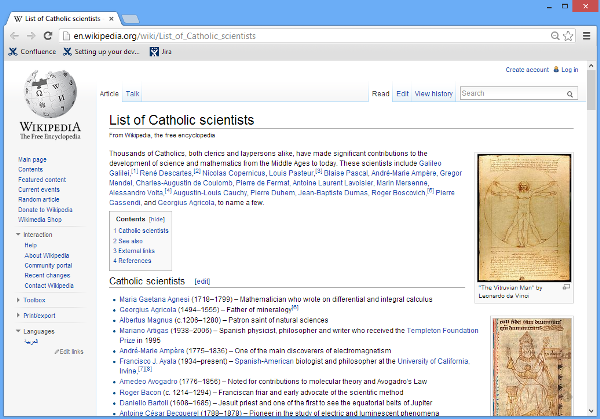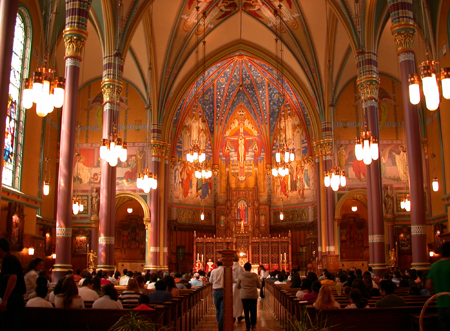Category: Catholicism
Marks of the Church
 Here’s Curtis Mitch, one of the commentators behind the Catholic New Testament Study Bible, speaking about my favourite Early Church Father, Ignatius of Antioch and the “Marks of the Church”:
Here’s Curtis Mitch, one of the commentators behind the Catholic New Testament Study Bible, speaking about my favourite Early Church Father, Ignatius of Antioch and the “Marks of the Church”:
Thanks to The Sacred Page for the link.
Easter: The Pagan Conspiracy
 I meant to write this post in the weeks leading up to last Easter, but I’m afraid it completely slipped my mind. Unfortunately, this meant that when Easter Sunday rolled around and all the “Easter is a pagan festival!” comments started to appear on Facebook and on blogs, I was repeatedly forced to write some off-the-cuff comments in response, rather than having something prepared here to which I could link.
I meant to write this post in the weeks leading up to last Easter, but I’m afraid it completely slipped my mind. Unfortunately, this meant that when Easter Sunday rolled around and all the “Easter is a pagan festival!” comments started to appear on Facebook and on blogs, I was repeatedly forced to write some off-the-cuff comments in response, rather than having something prepared here to which I could link.
I was reminded that I had intended to do this post a couple of days ago while reading an article in the Telegraph. The article in question was talking about how the Church of England has plans to create a new Pagan church to attract new people . Inter-faith dialog is one thing, but this sounds like something quite different. I’m intrigued as to what this’ll end up looking like. We’ll just have to wait and see…
So, I know Easter Sunday has long since passed. In fact, Pentecost has also been and gone and we’re even nearing the end of the Apostles’ Fast. However, I’ve decided to write a quick blog entry here in preparation for next year so that when we’re in the run up to Easter I’ll be ready 🙂
A festival by any other name…
The main thrust of most the comments I saw this year was over the word “Easter” itself. It was pointed out, ad nauseam, that the word “Easter” is most likely etymologically related to the word “Eostre”, a Germanic deity from paganism. The “logic” goes that, since the word “Easter” has pagan roots, the celebration itself must also be pagan. Makes sense, right? Err….no.
I’ll admit that when I see such comments I get a little irritated because I don’t think they’ve really thought through what it is that they’re saying nor have they applied their position consistently.
Some advice
Coming Soon: The Liturgical Apocalypse
The third chapter of Dr. Barber’s book he discusses the relationship between the Book of Revelation and the Catholic Liturgy. It is a brief review of the the material covered in another excellent book by Dr. Hahn’s book, The Lamb’s Supper.
Familiar Imagery & Structure
Dr. Barber begins by noting that no other apocalyptic book of antiquity relies quite so heavily on liturgical imagery as the Book of Revelation. In John’s book we find many things extremely familiar to a Catholic who attends Mass: Sunday worship, priests, vestments, incense, chalices, angels, saints etc.
In fact, the book of Revelation has profoundly impacted Christian liturgy and architecture throughout the centuries. For example, the celebrant’s chair is symbolic of the throne of God, and the surrounding chairs like those of the “elders” (Revelation 4:4).
This final book of the Bible is even divided into three parts which each have parallels with the sequence of the Catholic liturgy:
1. Penitential Rite
The early section of Revelation concerns seven letters which call the Church to repentance.
2. Liturgy of the Word
Later, a book is opened which brings about judgement.
3. Liturgy of the Eucharist
The book ends with the Church being united to Christ in the supper of the Lamb.
But why use liturgical imagery? Revelation uses liturgical imagery because the Eucharistic celebration is the way the Lord comes to His Church. Dr. Barber points out that the Greek word “parousia” which is used to refer to the Lord’s “coming” actually has the primary meaning of “presence”. Upon hearing this fact, every Catholic immediately thinks of the Eucharist and Jesus’ real presence in the Sacrament.
“Every Eucharist is Parousia, the Lord’s coming” – Cardinal Ratzinger
Awesome Roughhousing
 Here’s another gem from The Art of Manliness…
Here’s another gem from The Art of Manliness…
While I was back in England I was playing with my Godson and his brother on the trampoline and it naturally descended into roughhousing. I got an elbow in the face and fat lip, but it was a small price to pay for helping with the levels of awesome 🙂
The article Awesome Roughhousing first appeared on RestlessPilgrim.net
Coming Soon: Was Jesus wrong?
In Revelation, Jesus says that He is “…coming soon” (Revelation 22:20). However, it is now 2,000 years later and we haven’t yet had the Second Coming. Dr Barber, in the second chapter of his book, addresses the obvious question: “Was Jesus wrong?”.
How soon is soon?
Some exegetes solve this problem of Jesus’ absence by pointing to St. Peter’s second epistle:
But do not ignore this one fact, beloved, that with the Lord one day is as a thousand years, and a thousand years as one day – 2 Peter 3:8
These exegetes make the argument that Jesus is indeed coming “soon”, but our version of “soon” is not the same as His.


